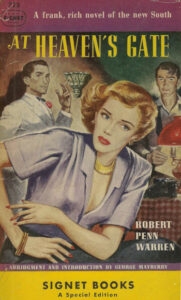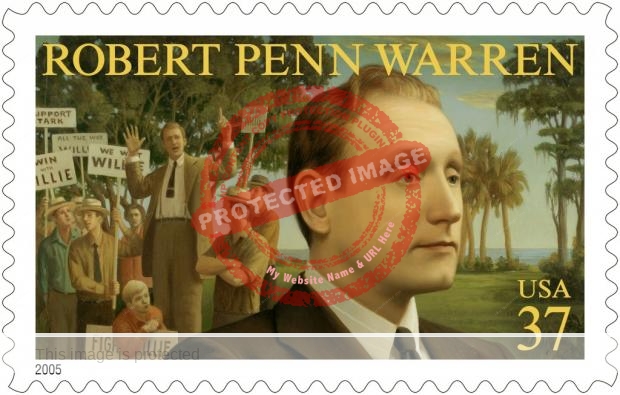Robert Penn Warren, the great American poet, novelist and literary critic, was born in Kentucky on 24 April 1905 and died in Vermont on 15 September 1989. Warren lived and wrote in Chapala for several months in the summer of 1941.
Warren entered Vanderbilt University in 1921, where he became the youngest member of a group of Southern poets known as the Fugitives. Other members included John Crowe Ransom, Allen Tate, Donald Davidson and Merrill Moore. Warren’s first poems were published in The Fugitive, the magazine published by the group from 1922 to 1925.
From 1925 to 1927, Warren taught at the University of California, while earning his master’s degree. He also studied at New College, Oxford as a Rhodes Scholar. After marrying Emma Brescia (nicknamed “Cinina”) and returning to the U.S. in 1930, he taught at Vanderbilt, Louisiana State, the University of Minnesota, and Yale University.
Warren was a charter member of the Fellowship of Southern Writers, and founded the influential literary journal The Southern Review with Cleanth Brooks in 1935. He and Brooks also co-wrote a textbook Understanding Poetry (1938), which would prove to have a profound influence on the study of poetry in American colleges.
Warren, accompanied by his wife Cinina, visited Chapala in 1941, two years after the publication of his acclaimed first novel Night Rider.
Relatively little is known about their stay at Chapala, or their motivation in choosing to go there. However, Warren did have a family connection to the nearby city of Guadalajara. In Portrait of a Father, published in 1988, the year before his death, Warren wrote about the similarities between his father’s life and his own. Among the family members recalled in the book is Warren’s uncle Sam, who had worked in mining and lived in Guadalajara. Warren adds that he had often been there “during a long stay at Chapala”.
A few tantalizing snippets of information can be gleaned from the correspondence between Warren and his colleague Cleanth Brooks, published by the University of Missouri Press in 1998.
In a letter dated 17 July 1941, and signed “Red” (Warren’s nickname on account of the color of his hair), he wrote, from the Hotel Nido in Chapala, that Chapala was “a tiny town on a lake, surrounded by mountains, with a fine climate”, before providing some details of his living arrangements:
We have rented a little house, new and verminless, for which we pay six dollars a month, though getting it screened raised the rent several dollars more. A cook is a dollar a week, and food is cheap. The place beautiful, smelly and picture-postcardy. There are some Americans about, including Witter Bynner – who, in fact was about, very much about, with a palatial establishment, but he left yesterday for Colorado. But we have led a pretty isolated life here. Cinina was pretty busy for a few days getting the domestic machinery in motion, and I’ve been working and studying Spanish and swimming and going to the can more often than usual. Not that I’ve got a bug in me yet, but the complaint seems to be usual here upon first arrival…” (Cleanth Brooks and Robert Penn Warren: A Literary Correspondence, p 55)
He bemoaned his lack of access to American magazines,
We’ve seen one copy of Time, Latin America edition, but you can’t buy it here at Chapala, and we don’t go to Guadalajara, thirty miles away, but once a week…”
Chapala did offer him, though, a good space in which to think and work:
I’ve got some ideas for new poems, but haven’t done anything on them since arrival. The novel occupies most of my thoughts.”
“The novel” is presumably his second novel, At Heaven’s Gate, first published in 1943.
The following month, August 1941, he wrote that he had mailed a manuscript from Guadalajara to The Southern Review, but had to go to the city by bus because he was temporarily without his car:
We still like Chapala, but are getting awfully anxious for Baton Rouge. It seems that our car may be ready within a few days–though one can’t be too sure. I saw the body work the other day in Guadalajara, and you can’t even tell that the thing had taken a beating. But it has shore [sic] God played hell with what passes for the Warren budget.”

Warren also referred in this letter to “the unexpected arrival of the Albrizios”, friends from the U.S., whom “Cinina just happened to see”, “on the street at Chapala”. He excused his relative lack of work progress as being due to “matters of weather, stubbing toes, catching colds, having hangovers, and such…”
By coincidence, the house rented by Warren was later the home in 1952/1953 of Willard Marsh, author of the novel Week With No Friday (set at Lake Chapala), and his wife George. The owner of the house remembered “Red” as “a nice person with “red” hair who drank a lot – and gave wonderful parties!”
Warren’s marriage to Cinina ended in 1951; the following year, he married Eleanor Clark. He received numerous awards for his work, including the 1947 Pulitzer Prize for the novel All the King’s Men (1946), as well as the Pulitzer Prize for Poetry in both 1958 and 1979. Warren is the only person to have won Pulitzer Prizes for both fiction and poetry. He was appointed as the first poet laureate of the United States (1986 -1987).
Two of Warren’s works were subsequently turned into movies: All the King’s Men (1949) and Band of Angels (1957).
Source:
- James A. Grimshaw (ed). 1998. Cleanth Brooks and Robert Penn Warren: A Literary Correspondence. University of Missouri Press.
Tony Burton’s books include “Lake Chapala: A Postcard History” (2022), “Foreign Footprints in Ajijic” (2022), “If Walls Could Talk: Chapala’s historic buildings and their former occupants” (2020), (available in translation as “Si Las Paredes Hablaran”), “Mexican Kaleidoscope” (2016), and “Lake Chapala Through the Ages” (2008).
